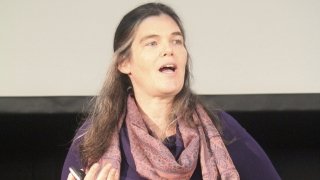The 36th Annual Pullias Lecture on February 19, 2014 centered on the fiercely debated topic of online open access higher education, also known as Massive Open Online Courses or MOOCs.
Daphne Koller, co-founder and co-CEO of Coursera, the education company that spearheaded the movement to offer free college courses online, delivered the lecture on the heels of USC President C. L. Max Nikias’ critique of MOOCs during his annual university address last week.
Koller, a professor in computer science at Stanford University, discussed the evolution of Coursera, which offers online classes from universities around the world and boasts an enrollment of 6.6 million students.
Nikias had spoken about the “academic earthquake” of online education, and noted the university’s own model that delivers academically rigorous online graduate programs to students around the world.
He emphasized, however, that undergraduate level programs are most effective with “face-to-face intellectual and creative encounters” and raised concerns about the prevalence of MOOCs that accommodate thousands of remote students but offer questionable quality and see significant drop-out rates.
In her welcoming remarks, USC Rossier Dean Karen Symms Gallagher referred to Nikias’ comments, including his emphatic assertion that USC would not offer MOOCs, which he had compared “to the dot.com bubble of the 1990s, when the focus (was) on the number of users rather than on the value that was created.”
Gallagher, author of a number of op-eds on the deficiencies of MOOCs and their vast difference from online/blended programs offered by USC Rossier, expressed the value of diverse perspectives toward the shared goal of improving access and success in education.
Adrianna Kezar, who co-directs the Pullias Center for Higher Education with William G. Tierney, gave opening remarks, and Michael W. Quick, executive vice provost of USC, introduced Koller.
Koller described how the MOOC movement began in September 2011 when Stanford decided to offer three graduate courses for free online as an experiment. Within a few weeks, 100,000 students were enrolled in each.
In an example of the far-reaching impact of MOOCs today, Koller shared the story of a social psychology professor, who taught only 12 students per semester in his liberal arts college but teaches 250,000 students in his MOOC. She described how MOOC students, who do not receive college credits, can find economic benefit from the “verified credentials” they earn.
Koller also addressed the oft-cited non-completion rates of MOOC students, asserting that “many sign up out of curiosity.” She said that data show among the subpopulation that states an intention the complete, 88 percent do.
Additionally, Koller shared how Coursera can facilitate more personalized instruction, as faculty members can use “big data” from thousands of students to identify patterns and make modifications.
Following the lecture, USC Rossier Professor Emeritus Richard Clark, former co-director of the Center for Cognitive Technology, offered his response and raised several questions related to the future of MOOCs and higher education. He noted that any form of education can be constructed well or poorly, and he suggested that educational researchers be integrated into efforts to create new technology solutions in higher education.
The annual Pullias Lecture, dedicated to the memory of Dr. Earl V. Pullias, is hosted by the USC Pullias Center for Higher Education. The series features a nationally recognized scholar each year who contributes to academic dialogue on significant topics in higher and postsecondary education. Pullias was a prolific writer, teacher, administrator and consultant, and he was one of the founding faculty members of USC’s Department of Higher and Postsecondary Education in 1957.




